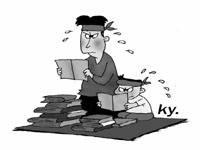
(Ecns.cn) – Suffering from anxiety about attaining the best education for their children has become a typical state for Chinese migrant workers, some of whom have their children with them in unfamiliar cities, while others have left their kids behind with grandparents.
To them, education is the only way to change the lives of the younger generations. And by maintaining high expectations, the parents hope their children will become social elites and not have to suffer from the grinding hardships of poverty and low education, according to China Youth Daily.
Fear of the same destiny
A popular Chinese song called "I would be you when I grow up" was composed to show respect and gratitude to seniors. But for many parents, the last thing they want is for their children to grow up to be like them.
He Xiaohong, a migrant worker in Beijing, has registered her son in many extracurricular activities, including basketball training every weekday, courses in Olympic Mathematics every Saturday morning and English courses on Saturday afternoons. Her son is now in fifth grade at primary school.
With such a tight schedule, both He Xiaohong and her son feel exhausted every day, yet their efforts are only designed to increase the probability of being admitted to a better middle school in Beijing.
According to He Xiaohong, only through education will her son be able to get ahead of others and land a decent job with a high salary.
Qiu Cuihua is also a migrant worker in Beijing. This year, Qiu budgeted 40,000 yuan (US$6,324) to cover three years of tuition and an allowance for her daughter in university, and she must also spend a large amount of money on her son as well.
Expectations and pressure
Families in China are highly invested in the educational success of their children; for migrant workers like He and Qiu, studying means hope for the future, just as the ancient Chinese referred to the process of changing destiny through learning and national exams as "carps jump over the dragon door."
However, a carp's chances are getting smaller and smaller in today's society. According to an article published in the People's Daily, people in the lower rungs of society, especially those from rural areas, are less likely to enter privileged universities than ever.
Since the 1990s, the proportion of rural students at leading universities in China has continued to fall; the ratio at Peking University, for example, has fallen to around 10 percent from the previous 30 percent, according to China Daily.
According to a sample survey of students at Tsinghua University in Beijing enrolled in 2010, students from the countryside accounted for 17 percent of the total, yet rural students took up 62 percent of the overall students joining the National College Entrance Examination that year.
This has added to a growing sense of anxiety among parents who want the best education for their kids, leading to a broader phenomenon of venting anger on children and pushing them much harder, sometimes to their detriment.
The mental state of parents is a reflection of the social psychology, commented Liao Liying, a researcher at the National Institute for Early Education Research and secretary-general of the China National Society of Early Childhood Education.
To relieve their anxiety, parents shift the pressure onto their children, forcing them to perform better academically and complete additional studies outside of school. As a result, many Chinese children have given up on personal interests and dreams after years of great pressure to learn, which is also a cause of their limited creativity.
Be happy?
Ma, who works in textbook compilation, is the mother of a 10-year-old boy. For many years, Ma maintained the idea that children should live a free and easy sort of life without much pressure, so she often took her son to the mountains or to parties thrown by his peers.
However, now that her son has turned 10 and is a student in the fourth grade, Ma is no longer sure of the relaxed approach, especially after she was told at a parents' meeting that her son's declining scores required her attention.
Liao Yazhu, director of the National Institute for Early Education Research, said that parents must be aware that their lives are their own, but their children's are not, and that each child is an independent individual. Parents should give them the right to choose which way to go in the future.
If all parents could understand that a child's success should be judged on his ability to live happily as a well-balanced human being, their anxiety would be gone, and the education industry would also go back to normal, without these extreme and stressful methods, added Liao.

Copyright ©1999-2011 Chinanews.com. All rights reserved.
Reproduction in whole or in part without permission is prohibited.